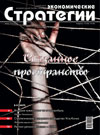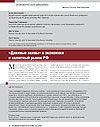“Long Waves” in the Economy and the RF Currency Market
The article dwells on actual problems — increase in the volatility of the ruble exchange rate and its depreciation in 2018. At the same time, it is assumed that dynamics of the ruble exchange rate in general reflects the underlying economic processes (including abroad). Before the economic crisis that began in 2008, the ruble exchange rate for many years was mainly strengthening, and its volatility was relatively low. The situation has changed because the economies of a number of countries (in particular, Russia) have entered into a long, difficult period. So, for about a decade, the Russian economy has been showing slow growth. At the same time, the ruble exchange rate tends to depreciate. This allows the authors to assume that dynamics of the ruble exchange rate, which passed from a long upward to a downward stage about ten years ago, may be associated with a similar transition of the economy of Russia and some other countries to a downward stage (in N.D. Kondratieff terminology). The article analyzes a number of approaches to the problems of “long waves” in the economy and a conclusion is drawn up on the necessity to develop the RF monetary strategy (taking into account long-term macroeconomic processes).
References:
- Global market structures and the high price of protectionism. BIS, 2018, Аugust, 25, pp. 8–9.
- Ershov M.V., Lokhmachev V.F., Tatuzov V.Yu., Tanasova A.S. O global’nykh krizisnykh tendentsiyakh [On the Global Crisis Trends]. Ekonomika Rossii ХХI vek, 2012, no 23, p. 34.
- Tatuzov V.Yu., Lokhmachev V.F. Vneshnie riski i ekonomika Rossii [External Risks and the Economy of Russia]. Analiticheskii bankovskii zhurnal, 2006, no 12, p. 20.
- Ershov M.V., Lokhmachev V.F., Tatuzov V.Yu., Tanasova A.S. Global’nyi krizis (sravnitel’nyi analiz tsiklicheskikh protsessov) [Global Crisis (Comparative Analysis of Cyclic Processes)]. Bankovskoe delo, 2009, no 5, p. 19.
- Mau V. Na iskhode global’nogo krizisa: ekonomicheskie zadachi 2017–2019 gg. [At the End of the Global Crisis: Economic Challenges of 2017–2019]. Voprosy ekonomiki, 2018, no 3, p. 6.
- Gauging procyclicality and financial vulnerability in Asia through the BIS banking and financial statistics. WP N 735. BIS, 2018, p. 9.
- Grinin L.E., Grinin A.L. O shestom tekhnologicheskom uklade [On the Sixth Technological Order]. V knige: N.D. Kondrat’ev: krizisy i prognozy v svete teorii “dlinnykh voln” [N.D. Kondratieff: Crises and Forecasts in the Light of the “Long Waves” Theory]. Moscow, Uchitel’, 2017, p. 207.
- Glaz’ev S.Yu. Perekhod k novoi ideologii upravleniya global’nym ekonomicheskim razvitiem [Transition to a New Ideology of Global Economic Development Management]. Vystuplenie na kruglom stole “Issledovaniya ekonomicheskikh tsiklov i krizisov v Rossii” [Speech at the Round Table “Studies of Economic Cycles and Crises in Russia”]. Moscow, RANKhiGS, 2016, April, 8. Problemy teorii i praktiki upravleniya, 2016, no 6.
- Glaz’ev S.Yu. Kak ne proigrat’ v voine [How Not to Lose the War]. Moscow, Voennye materialy, 2014, p. 12



